|
1. Nets, Especially CBS, Paint "Cuts" Hurting "Homeless" & "Hungry"
All of the media have pounced on the Bush administration's desire to "cut" spending on a few programs, focusing on how some small spending adjustments will hurt the poor, but none more so than CBS on Monday night. Lee Cowan devoted a full story to how "the proposed cuts hit the heartland like a mountain of unwanted news, from the soy bean fields of Iowa...to large cities like Minneapolis, where block grant programs help the homeless and the hungry." Cowan, who failed to cite a single proposed budget number, showcased complaints from food bank and health care workers and, led into a soundbite from the unlabeled Robert Greenstein of the Center on Budget and Policy Priorities, by stressing how "critics charge the people these cuts hit the hardest tend to have the weakest political voice." The morning shows on Monday reflected how network journalists portray cuts as undesirable, referring to "severe cutbacks," "steep cuts" and to how the budget will "slash spending."
2. NBC
Today's Coverage of Bush's SS Reform Brought to You by AARP
NBC Today's coverage of President Bush's Social Security reform plan brought to you by...the AARP, a vociferous opponent. During the 7am half hour on Monday Today brought aboard a supporter of Bush's plan and paired him with David Certner, Director of federal affairs for the AARP. Katie Couric cued up Certner with softballs, such as "what is your biggest beef with the President's plan to reform Social Security?" and "what kind of things, do you think, could be implemented to improve it [Social Security program]?" Then, an hour later, as the AARP logo was displayed on screen with the group's marketing phrase beneath it, NBC's announcer credited the group for paying for the weather update and voiced their phrase: "Today's weather is brought to you by AARP. The power to make it better."
3. Jobs Report Undermines Dan Rather's Comparison of Bush to Hoover
Friday's jobs report contradicted what Dan Rather declared on the CBS Evening News a few months ago. On October 8, Rather accurately stated that President Bush was facing the "election with 821,000 fewer jobs in the nation than when he took office," but Rather then asserted: "It's the first net job loss on a President's watch since Herbert Hoover during the Great Depression of the 1930s." In fact, from February 1, 2001 through January 31, 2005, the job statistics reporting period which matches Bush's first term, the nation gained 119,000 jobs, thus undermining the Democratic campaign spin echoed by the media. While ABC's Peter Jennings noted Bush would now "avoid being the first President since Herbert Hoover to endure a net loss of jobs during a term," NBC and CNN failed to acknowledge how the Bush record obliterated that Democratic campaign spin.
4. CBS Hopeful on Iraq, NBC Warns of Islamic Law, Breaking Apart
The NBC and CBS anchors on Monday night introduced stories from Iraq by pointing out how it had
been the deadliest day since the election, but the subsequent stories diverged in how they forecast the future. While NBC's Richard Engel noted "a sense of pride and ownership Iraqis feel after the elections," he painted an ominous future: "Images of Shiites declaring victory after years of oppression by Sunnis have skeptics doubting talk of easy reconciliation." He asserted that "there are increasing fears the Shiite clerics will use their new power to gradually impose Islamic law" and he cited a claim that "the country could break apart." But CBS's Kimberly Dozier saw signs of a hopeful future as she touted how "the numbers of Iraqis signing up for security forces has risen from the hundreds to the thousands" as Iraqis "have a newfound pride in those who died on election day for standing up to the militants." She highlighted how Mosul's police chief is "airing the confessions of captured insurgents to shame them and to show the police are on the insurgents' trail."
 Nets, Especially CBS, Paint "Cuts" Hurting Nets, Especially CBS, Paint "Cuts" Hurting
"Homeless" & "Hungry"
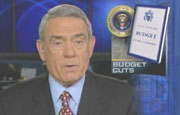 All of the media have pounced on the Bush administration's desire to "cut" spending on a few programs, focusing on how some small spending adjustments will hurt the poor, but none more so than CBS on Monday night. Lee Cowan devoted a full story to how "the proposed cuts hit the heartland like a mountain of unwanted news, from the soy bean fields of Iowa...to large cities like Minneapolis, where block grant programs help the homeless and the hungry." Cowan, who failed to cite a single proposed budget number, showcased complaints from food bank and health care workers and, led into a soundbite from the unlabeled Robert Greenstein of the Center on Budget and Policy Priorities, by stressing how "critics charge the people these cuts hit the hardest tend to have the weakest political voice."
All of the media have pounced on the Bush administration's desire to "cut" spending on a few programs, focusing on how some small spending adjustments will hurt the poor, but none more so than CBS on Monday night. Lee Cowan devoted a full story to how "the proposed cuts hit the heartland like a mountain of unwanted news, from the soy bean fields of Iowa...to large cities like Minneapolis, where block grant programs help the homeless and the hungry." Cowan, who failed to cite a single proposed budget number, showcased complaints from food bank and health care workers and, led into a soundbite from the unlabeled Robert Greenstein of the Center on Budget and Policy Priorities, by stressing how "critics charge the people these cuts hit the hardest tend to have the weakest political voice."
Not CBS nor any network story on Monday night pointed out how minimal te proposed cuts really are. Chris Edwards, Director of tax policy studies at the Cato Institute, observed on the group's Web site: "The budget proposes to cut 150 programs, but the fine print shows that these cuts will only reduce 2006 spending by 0.8 percent." See: www.cato.org
The morning shows on Monday reflected how network journalists paint cuts as undesirable, referring to "severe cutbacks," "steep cuts" and to how the budget will "slash spending."
On ABC's Good Morning America, for instance, news reader Bill Weir announced during the 8am update: "President Bush is releasing his $2.5 trillion budget today. It singles out 150 programs for elimination or severe cutbacks, including farm subsidies and health care for the poor. The spending plan does not include the cost of military operations in Iraq and Afghanistan."
Over on NBC's Today, Norah O'Donnell checked in from the White House: "The President is proposing today the tightest budget of his presidency and it's gonna slash spending across, across a wide swath of the government. Defense and Homeland Security will get an increase in funds but there will be a 150 other very politically sensitive programs that will be cut or eliminated. For example the President's budget would cut funding for Amtrak, tighten eligibility for food stamps for the poor, raise prescription drug prices for veterans and reduce popular government-subsidies for America's farmers. Now Vice President Dick Cheney has defended the steep cuts in scores of programs as fair, reasonable and responsible. But this budget is going to spark an intense battle on Capitol Hill with some Republican members already predicting that some of the cuts are dead on arrival. The administration is defending this tight, tight budget because they say the President wants to keep his campaign promise to cut the deficit in half in the next five years. Ann."
Back to Monday's CBS Evening News, John Roberts provided an overview of the budget proposal and the Democratic reaction, but no numbers for the program areas subsequently explored by reporter Lee Cowan. Then Rather set up the Cowan piece:
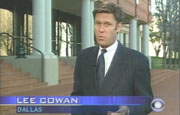 "The President's budget would cut aid to farmers sharply. He'd lower the cap on their annual subsidies from $360,000 to $250,000 year. That's a cap. CBS's Lee Cowan gives you a look at the impact of the budget down on the farm and in the inner cities." "The President's budget would cut aid to farmers sharply. He'd lower the cap on their annual subsidies from $360,000 to $250,000 year. That's a cap. CBS's Lee Cowan gives you a look at the impact of the budget down on the farm and in the inner cities."
With "Bush Budget: Hardest Hit" briefly on screen, Cowan began: "The proposed cuts hit the heartland like a mountain of unwanted news, from the soy bean fields of Iowa, where farmers marched on the capitol to voice their disgust at slashing farm subsidies, to large cities like Minneapolis, where block grant programs help the homeless and the hungry."
R.T. Rybak, Minneapolis Mayor: "This isn't strengthening America's communities. It's ripping the heart out of those who are the heart of this community."
Cowan: "The White House calls the budget 'lean' -- proponents call it difficult but brave. But critics charge the people these cuts hit the hardest tend to have the weakest political voice."
Robert Greenstein, Center of Budget and Policy Priorities: "Cuts in programs for the working poor, low income elderly people, people with disabilities. They tend not to have much in the way of lobbyists. They don't give campaign contributions."
Cowan: "Take the north Texas food bank that serves some 55,000 families every month."
Jan Pruitt, North Texas Food Bank: "We see a trickle down effect a lot of times any time there's a budget cut in any of the really safety net programs."
Cowan: "And nowhere is that more evident than in the proposed cuts in health care. How tight is it already for you?"
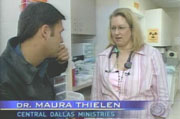 Dr. Maura Thielen, Central Dallas Ministries: "It's already pretty tough." Dr. Maura Thielen, Central Dallas Ministries: "It's already pretty tough."
Cowan: "This Dallas health clinic serves only the poorest of patients, but already there is a two-month waiting list. Dr. Maureen Thielen says the President's proposed cuts in Medicaid will only make it worse."
Thielen, with Cowan propped up on a counter next to her: "We're just going to have to turn away more patients than we already are."
Cowan concluded: "The President says he only wants taxpayers to pay for programs that actually get results. But that's where the real battle may lie because agencies that are already doing the work of the poor now find themselves in the unenviable position of proving that their cause is worth it. Lee Cowan, CBS News, Dallas."
  NBC
Today's Coverage of Bush's SS Reform NBC
Today's Coverage of Bush's SS Reform
Brought to You by AARP
NBC Today's coverage of President Bush's Social Security reform plan brought to you by...the AARP, a vociferous opponent. During the 7am half hour on Monday Today brought aboard a supporter of Bush's plan and paired him with David Certner, Director of federal affairs for the AARP. Katie Couric cued up Certner with softballs, such as "what is your biggest beef with the President's plan to reform Social Security?" and "what kind of things, do you think, could be implemented to improve it [Social Security program]?" Then, an hour later, as the AARP logo was displayed on screen with the group's marketing phrase beneath it, NBC's announcer credited the group for paying for the weather update and voiced their phrase: "Today's weather is brought to you by AARP. The power to make it better."
CBS's The Early Show is also on the AARP's dole. As noted in a February 2 CyberAlert item about actor Richard Gere's contention that "the Iraqis and us are not separate. Even Saddam Hussein and us, we are not separate," CBS used its taped session with Gere to kick off a new series sponsored by the AARP, "The Big 5-0," as in 50 years-old or, in Gere's case, older. See: www.mediaresearch.org
Couric opened Monday's Today, the MRC's Geoff Dickens observed, by touting how "a new Newsweek poll shows only 26 percent of Americans support the President's proposed changes. What's it going to take for him to sell his plan to a somewhat skeptical public? We're gonna talk with both sides when we have a debate."
She set up her session on Social Security: "On Close Up this morning, President's controversial plan for Social Security. Derrick Max is the Executive Director of the Alliance for Worker Retirement Security and David Certner is Director of federal affairs for the AARP. Gentlemen good morning to both of you."
Couric's questions:
-- "Mr. Certner let me talk, start with you. In simple terms so I don't have to work at the Congressional Budget Office to understand what is your biggest beef with the President's plan to reform Social Security?"
-- "Derrick Max what's your reaction to some of those grievances?"
-- "What about, Mr. Certner, the, the cost to changing Social Security? Actually I should ask Mr. Max about this because I've read in many places it's gonna cost billions even trillions of dollars to switch to private accounts and, and for a variety of reasons. Can we really afford to do that right now? And even the President himself has said private accounts alone will not provide the solution, right?"
-- "So what are some of the options then, Mr. Certner in terms of reforming the system? Clearly, even though you may debate exactly when it's gonna be in trouble, it will be in trouble at some point. So what kind of things, do you think, could be implemented to improve it?"
-- "What about that Mr. Max? What about moving money out of the system at a time when it can really not afford it?"
-- "What other, what other things could be done? I asked Mr. Certner that question but in addition to the setting up private accounts, what else, in your view? What about things like means testing for example?"
-- "Let me ask you about whether we're in a crisis situation because it seems like everybody disagrees about the shape Social Security is in. After his State of the Union address President Bush visited, as we know, several states to push his Social Security reforms telling one crowd, 'In 2042 it's bust. Those are the facts.' True or not? Mr. Certner, start with you."
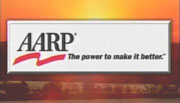 -- "And finally Mr. Max a new Newsweek poll shows that only 26 percent of Americans approve of President Bush's changes to Social Security. 36 percent are against them, 30 percent are not familiar with his plan. Do you think he has the political capital to pull this off or is he trying to do too much as President Clinton did when it came to reforming health care?"
-- "And finally Mr. Max a new Newsweek poll shows that only 26 percent of Americans approve of President Bush's changes to Social Security. 36 percent are against them, 30 percent are not familiar with his plan. Do you think he has the political capital to pull this off or is he trying to do too much as President Clinton did when it came to reforming health care?"
Nearly an hour later, as 8:05am: "Today's weather is brought to you by AARP. The power to make it better."
  Jobs Report Undermines Dan Rather's Comparison
of Bush to Hoover Jobs Report Undermines Dan Rather's Comparison
of Bush to Hoover
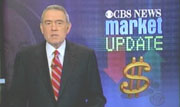 Friday's jobs report contradicted what Dan Rather declared on the CBS Evening News a few months ago. On October 8, Rather accurately stated that President Bush was facing the "election with 821,000 fewer jobs in the nation than when he took office," but Rather then asserted: "It's the first net job loss on a President's watch since Herbert Hoover during the Great Depression of the 1930s." In fact, from February 1, 2001 through January 31, 2005, the job statistics reporting period which matches Bush's first term, the nation gained 119,000 jobs, thus undermining the Democratic campaign spin echoed by the media.
Friday's jobs report contradicted what Dan Rather declared on the CBS Evening News a few months ago. On October 8, Rather accurately stated that President Bush was facing the "election with 821,000 fewer jobs in the nation than when he took office," but Rather then asserted: "It's the first net job loss on a President's watch since Herbert Hoover during the Great Depression of the 1930s." In fact, from February 1, 2001 through January 31, 2005, the job statistics reporting period which matches Bush's first term, the nation gained 119,000 jobs, thus undermining the Democratic campaign spin echoed by the media.
As recounted in the October 9 CyberAlert, CBS was the most negative and most pointed in tying Bush's political health to the September jobs report showing a 96,000 gain. "Tonight, where are the jobs?", Dan Rather demanded at the top of the October 8 CBS Evening News before driving home the political implications: "A disappointing report on the economy is out just weeks before the election." Rather asserted, in setting up his lead story, that "what's troubling is the number of jobs the economy did and did not create. CBS's Anthony Mason reports it's far fewer than expected, far fewer than needed." Mason relayed how an economist who "likens the latest jobs numbers to a bloop single in the bottom of the ninth when your team is way behind. They might offer some hope, he says, but they're not going to win the game." Introducing a second story, Rather stressed: "It's the first net job loss on a President's watch since Herbert Hoover during the Great Depression of the 1930s." See: www.mediaresearch.org
But the AP's Jeannine Aversa reported in a dispatch carried in many Saturday newspapers: "President Bush's first term in office, however, ended up showing a net gain in payroll jobs. From January 2001 to January 2005, the economy generated a net gain of 119,000 jobs. That allows Bush to escape being what Democrats and other critics had projected as the first President since Herbert Hoover to have a net loss of jobs on his watch."
Reporting Friday night on the January jobs report, Rather did not note how the numbers contradicted his earlier assertion, but did at least acknowledge the jobs gain was "enough for President Bush to end his first term with a net job gain." Though the unemployment rate fell from 5.4 to 5.2 percent in January, CBS and the other networks spun the numbers in a negative direction.
Rather announced on the February 4 CBS Evening News, as caught by the MRC's Brad Wilmouth: "In the first look at the jobs picture this year, the government says the unemployment rate fell in January to 5.2 percent. The economy created fewer jobs than economists had predicted but enough for President Bush to end his first term with a net job gain."
On ABC's World News Tonight, Peter Jennings reported: "In the economic news today, the government said the economy added 146,000 jobs in January. That was 50,000 less than expected. But it was enough for President Bush to avoid being the first president since Herbert Hoover to endure a net loss of jobs during a term. On Wall Street, traders saw the silver lining. Weaker job growth eases the pressure to raise interest rates. And the Dow Jones ended up 123 points."
NBC and CNN, however, failed to acknowledge how the Bush record obliterated the Democratic campaign spin about Hoover. NBC Nightly News anchor John Seigenthaler maintained: "The U.S. job market is off to a modest start this year. American employers added 146,000 jobs last month, but that fell short of what economists were expecting. Meanwhile, the overall unemployment rate fell 2/10 to 5.2 percent, its lowest level since September 2001."
Friday's NewsNight on CNN didn't even mention the unemployment/jobs numbers, the MRC's Ken Shepherd determined, and other shows stressed the negative as they failed to point out how a Democratic talking point so often repeated by reporters had been undermined. Lou Dobbs trumpeted on his CNN show on Friday night: "Tonight, further and startling new evidence of the assault of this country's middle class. The number of new jobs in this country has once again fallen behind our population growth, and prices on just about everything are rising faster than most Americans' paychecks."
An hour later, on the 7pm EST Anderson Cooper 360, substitute anchor Soledad O'Brien related: "A somewhat disappointing jobs report, that's what tops our look at news cross-country tonight. Washington, D.C., the Labor Department reports that America's employers added 146,000 jobs last month. That's a higher number than the month before, but lower than what analysts had been expecting."
  CBS Hopeful on Iraq, NBC Warns of Islamic CBS Hopeful on Iraq, NBC Warns of Islamic
Law, Breaking Apart
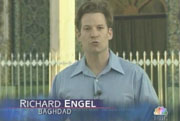 The NBC and CBS anchors on Monday night introduced stories from Iraq by pointing out how it had
been the deadliest day since the election, but the subsequent stories diverged in how they forecast the future. While NBC's Richard Engel noted "a sense of pride and ownership Iraqis feel after the elections," he painted an ominous future: "Images of Shiites declaring victory after years of oppression by Sunnis have skeptics doubting talk of easy reconciliation." He asserted that "there are increasing fears the Shiite clerics will use their new power to gradually impose Islamic law" and he cited a claim that "the country could break apart." But CBS's Kimberly Dozier saw signs of a hopeful future as she touted how "the numbers of Iraqis signing up for security forces has risen from the hundreds to the thousands" as Iraqis "have a newfound pride in those who died on election day for standing up to the militants." She highlighted how Mosul's police chief is "airing the confessions of captured insurgents to shame them and to show the police are on the insurgents' trail."
The NBC and CBS anchors on Monday night introduced stories from Iraq by pointing out how it had
been the deadliest day since the election, but the subsequent stories diverged in how they forecast the future. While NBC's Richard Engel noted "a sense of pride and ownership Iraqis feel after the elections," he painted an ominous future: "Images of Shiites declaring victory after years of oppression by Sunnis have skeptics doubting talk of easy reconciliation." He asserted that "there are increasing fears the Shiite clerics will use their new power to gradually impose Islamic law" and he cited a claim that "the country could break apart." But CBS's Kimberly Dozier saw signs of a hopeful future as she touted how "the numbers of Iraqis signing up for security forces has risen from the hundreds to the thousands" as Iraqis "have a newfound pride in those who died on election day for standing up to the militants." She highlighted how Mosul's police chief is "airing the confessions of captured insurgents to shame them and to show the police are on the insurgents' trail."
The MRC's Brad Wilmouth corrected the two February 7 stories against the closed-captioning.
-- NBC Nightly News. Brian Williams: "And now to Iraq, where hopes for peace have run high since the election, and where today, sadly, suicide bombers attacked two cities in the deadliest single day since that nation's election. Still tonight there is hopeful news to be found there. NBC's Richard Engel has our report from Baghdad."
Engel began over video of destruction: "Iraqi police had thought it was finally safe enough to go back to work in Mosul. Today they were re-enlisting when a suicide bomber walked up and killed 12. In Baqouba, another suicide bomb attack also targeted police, killing 15. But in Baghdad, police officials told NBC News today they're getting more intelligence tips than ever, crediting a sense of pride and ownership Iraqis feel after the elections.
"As of today, half of the votes have been counted. A Shiite bloc supported by their grand Ayatollah Ali al Sistani leads with 60 percent. Iraqi Kurds, 25 percent. The secular ticket of interim prime minister Iyad Allawi, only 15 percent. And still no definitive word on the turnout of Sunni Muslims, 20 percent of the population. But the emerging front runner, to be the next prime minister, Adel Abdel-Mahdi, an al Sistani-backed moderate Shiite, says he wants to include Sunnis."
Adel Abdel Mahdi, Interim Iraqi Finance Minister: "We are not counting majorities or minorities. We want the participation of all, of all others, regardless of the numbers they got."
Engel: "But images of Shiites declaring victory after years of oppression by Sunnis have skeptics doubting talk of easy reconciliation. Even before the final vote count is in, it's clear the Shiites have gained the most from these elections. Now, there are increasing fears the Shiite clerics will use their new power to gradually impose Islamic law. Abdel Sattar Jawad, editor of a moderate Iraqi daily newspaper, says if Sunnis are left out, the country could break apart."
Abdel Sattar Jawad: "The government will be very weak, and it can't survive in any way. I can't see any future for such a government excluding the Sunnis."
Engel concluded: "Officials hope to have all the votes counted by the end of the week, the national assembly seated by the 15th, and the political horse-trading finished by the end of the month. Richard Engel, NBC News, Baghdad."
-- CBS Evening News. Dan Rather: "In Iraq, this was the deadliest day since last week's election. More than 30 people were killed in a series of attacks. And as Kimberly Dozier reports, most of the victims were among the growing number of Iraqis trying to help make their country safer."
Dozier began with the negative, but soon switched to some positive trends: "A suicide car bomb hit a number of would-be Iraqi recruits as they lined up outside Baqouba's police headquarters today. And a man wearing a suicide vest blew up a group of policemen outside a hospital after calling them to his aid.
"But the attacks don't seem to be slowing a dangerous new trend -- dangerous, that is, for the insurgents. In the week after the elections, U.S. officials say the numbers of Iraqis signing up for security forces has risen from the hundreds to the thousands. [video of police inspecting cars at a checkpoint] Inspired by the success of their civic action, officials say Iraqis, in the cities at least, have a newfound pride in those who died on election day for standing up to the militants like an Iraqi policemen who was on guard at this polling station. Eyewitnesses say he gave his life to stop a suicide bomber from reaching the crowd. 'He was a hero,' they said.
"In Mosul, where the turnout surpassed all expectations, the police chief set a deadline of next week for insurgents to lay down their arms. Aided by coalition advisors, he's also released a series of public service announcements, airing the confessions of captured insurgents to shame them and to show the police are on the insurgents' trail. 'This man is a butcher,' the announcer intones. U.S. officials want to capitalize on what they see as anti-militant momentum, building Iraqi confidence in themselves and their forces."
Major Darius Gallegos, U.S. Army: "I tip my hat to all of them to push forward, hold their ground, and remain working."
Dozier: "And you think you can find more like that?"
Gallegos: "Yes, I do."
Dozier concluded: "And with more men and women like these, the Americans hope, the balance will tip in the Iraqis' favor. Kimberly Dozier, CBS News, Baghdad."
-- Brent Baker

Home | News Division
| Bozell Columns | CyberAlerts
Media Reality Check | Notable Quotables | Contact
the MRC | Subscribe
|





















 All of the media have pounced on the Bush administration's desire to "cut" spending on a few programs, focusing on how some small spending adjustments will hurt the poor, but none more so than CBS on Monday night. Lee Cowan devoted a full story to how "the proposed cuts hit the heartland like a mountain of unwanted news, from the soy bean fields of Iowa...to large cities like Minneapolis, where block grant programs help the homeless and the hungry." Cowan, who failed to cite a single proposed budget number, showcased complaints from food bank and health care workers and, led into a soundbite from the unlabeled Robert Greenstein of the Center on Budget and Policy Priorities, by stressing how "critics charge the people these cuts hit the hardest tend to have the weakest political voice."
All of the media have pounced on the Bush administration's desire to "cut" spending on a few programs, focusing on how some small spending adjustments will hurt the poor, but none more so than CBS on Monday night. Lee Cowan devoted a full story to how "the proposed cuts hit the heartland like a mountain of unwanted news, from the soy bean fields of Iowa...to large cities like Minneapolis, where block grant programs help the homeless and the hungry." Cowan, who failed to cite a single proposed budget number, showcased complaints from food bank and health care workers and, led into a soundbite from the unlabeled Robert Greenstein of the Center on Budget and Policy Priorities, by stressing how "critics charge the people these cuts hit the hardest tend to have the weakest political voice."  "The President's budget would cut aid to farmers sharply. He'd lower the cap on their annual subsidies from $360,000 to $250,000 year. That's a cap. CBS's Lee Cowan gives you a look at the impact of the budget down on the farm and in the inner cities."
"The President's budget would cut aid to farmers sharply. He'd lower the cap on their annual subsidies from $360,000 to $250,000 year. That's a cap. CBS's Lee Cowan gives you a look at the impact of the budget down on the farm and in the inner cities."  Dr. Maura Thielen, Central Dallas Ministries: "It's already pretty tough."
Dr. Maura Thielen, Central Dallas Ministries: "It's already pretty tough." 
 -- "And finally Mr. Max a new Newsweek poll shows that only 26 percent of Americans approve of President Bush's changes to Social Security. 36 percent are against them, 30 percent are not familiar with his plan. Do you think he has the political capital to pull this off or is he trying to do too much as President Clinton did when it came to reforming health care?"
-- "And finally Mr. Max a new Newsweek poll shows that only 26 percent of Americans approve of President Bush's changes to Social Security. 36 percent are against them, 30 percent are not familiar with his plan. Do you think he has the political capital to pull this off or is he trying to do too much as President Clinton did when it came to reforming health care?"
 Friday's jobs report contradicted what Dan Rather declared on the CBS Evening News a few months ago. On October 8, Rather accurately stated that President Bush was facing the "election with 821,000 fewer jobs in the nation than when he took office," but Rather then asserted: "It's the first net job loss on a President's watch since Herbert Hoover during the Great Depression of the 1930s." In fact, from February 1, 2001 through January 31, 2005, the job statistics reporting period which matches Bush's first term, the nation gained 119,000 jobs, thus undermining the Democratic campaign spin echoed by the media.
Friday's jobs report contradicted what Dan Rather declared on the CBS Evening News a few months ago. On October 8, Rather accurately stated that President Bush was facing the "election with 821,000 fewer jobs in the nation than when he took office," but Rather then asserted: "It's the first net job loss on a President's watch since Herbert Hoover during the Great Depression of the 1930s." In fact, from February 1, 2001 through January 31, 2005, the job statistics reporting period which matches Bush's first term, the nation gained 119,000 jobs, thus undermining the Democratic campaign spin echoed by the media. 
 The NBC and CBS anchors on Monday night introduced stories from Iraq by pointing out how it had
been the deadliest day since the election, but the subsequent stories diverged in how they forecast the future. While NBC's Richard Engel noted "a sense of pride and ownership Iraqis feel after the elections," he painted an ominous future: "Images of Shiites declaring victory after years of oppression by Sunnis have skeptics doubting talk of easy reconciliation." He asserted that "there are increasing fears the Shiite clerics will use their new power to gradually impose Islamic law" and he cited a claim that "the country could break apart." But CBS's Kimberly Dozier saw signs of a hopeful future as she touted how "the numbers of Iraqis signing up for security forces has risen from the hundreds to the thousands" as Iraqis "have a newfound pride in those who died on election day for standing up to the militants." She highlighted how Mosul's police chief is "airing the confessions of captured insurgents to shame them and to show the police are on the insurgents' trail."
The NBC and CBS anchors on Monday night introduced stories from Iraq by pointing out how it had
been the deadliest day since the election, but the subsequent stories diverged in how they forecast the future. While NBC's Richard Engel noted "a sense of pride and ownership Iraqis feel after the elections," he painted an ominous future: "Images of Shiites declaring victory after years of oppression by Sunnis have skeptics doubting talk of easy reconciliation." He asserted that "there are increasing fears the Shiite clerics will use their new power to gradually impose Islamic law" and he cited a claim that "the country could break apart." But CBS's Kimberly Dozier saw signs of a hopeful future as she touted how "the numbers of Iraqis signing up for security forces has risen from the hundreds to the thousands" as Iraqis "have a newfound pride in those who died on election day for standing up to the militants." She highlighted how Mosul's police chief is "airing the confessions of captured insurgents to shame them and to show the police are on the insurgents' trail."